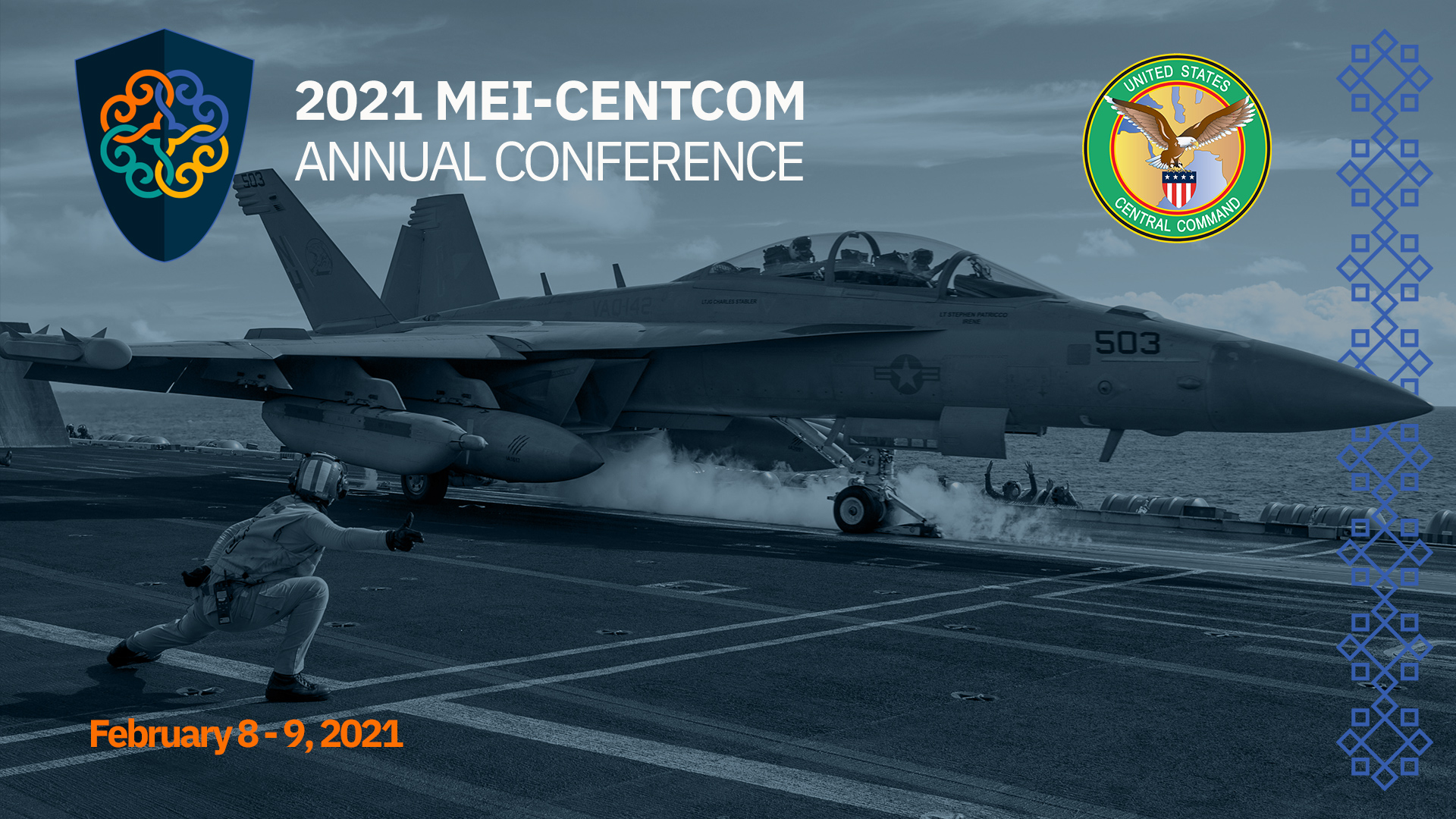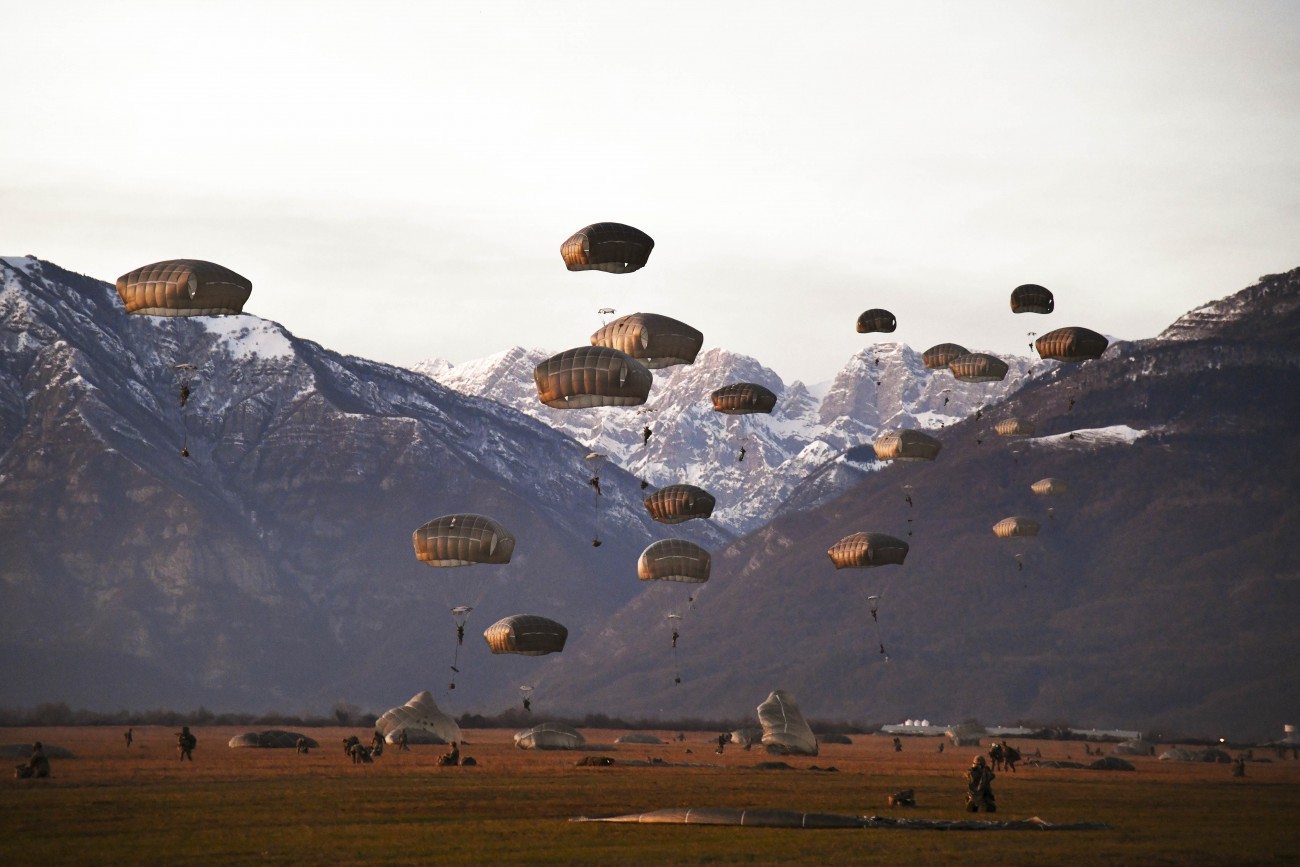


The MEI-CENTCOM Annual Conference is a flagship event of MEI’s Defense and Security Program
It convenes top CENTCOM leadership and staff as well as some of the world’s leading Middle East scholars and practitioners to discuss the challenges and opportunities facing the United States and its regional partners. Unique in the U.S. public policy and think tank communities, this two-day conference features speeches by CENTCOM leaders in addition to multiple policy-relevant panels on a range of strategic, political, military, and economic issues in the region.

2021 Conference
The first MEI-CENTCOM conference featured seven virtual panels over two days as well as a keynote address by General Kenneth F. McKenzie, Jr., Commander of U.S. Central Command, and closing remarks by Vice Admiral James Malloy, Deputy Commander of U.S. Central Command.
Please note that, except for Gen. McKenzie's keynote, attendance for the conference was by invitation only, and the sessions were held under Chatham House Rule.
Day 1 Agenda
February 8, 2021
9:00 – 10:15am
Keynote Address by Gen. Kenneth F. McKenzie, Jr
Paul Salem (opening remarks) President, MEI
Amb. (ret.) Gerald Feierstein (moderator) Senior Vice President, MEI
General Kenneth F. McKenzie, Jr. Commander, U.S. Central Command
10:20 – 11:20am
The Middle East under the Biden Administration
- What are the key drivers of instability in the region?
- Should we stay or should we leave?
- How can U.S. security cooperation be improved?
Bilal Y. Saab Senior Fellow and Director, Defense and Security Program, MEI
Paul Salem President, MEI
Gen. (ret.) Joseph Votel Distinguished Senior Fellow on National Security, MEI; Former Commander, U.S. Central Command
Kathryn Wheelbarger Former Assistant Secretary of Defense for International Security Affairs, U.S. Department of Defense
Deborah Amos (moderator) Reporter, NPR
11:25 am – 12:25 pm
Iran: Pathways to De-escalation
- What is the political future of Iran after Khamenei?
- Is Iran prospering or struggling in the region?
- How can Washington and Tehran avoid war?
Suzanne Maloney Vice President and Director of Foreign Policy, The Brookings Institution
Kenneth M. Pollack Resident Scholar, American Enterprise Institute
Alex Vatanka Senior Fellow and Director, Iran Program, MEI
Robin Wright Joint Fellow, U.S. Institute of Peace and Woodrow Wilson Center for International Scholars
Carol Giacomo (moderator) Ferris Professor, Princeton University; Former Correspondent, The New York Times
12:30 – 1:30 pm
The Future of Iraq
- Can the Iraqi political system survive?
- How can Iran’s nefarious influence be effectively countered?
- What is the future of U.S.-Iraqi relations?
Hafsa Halawa Non-Resident Scholar, MEI
Abbas Kadhim Resident Senior Fellow and Director, Iraq Initiative, Atlantic Council
Omar Al-Nidawi Program Manager, Enabling Peace in Iraq Center
Randa Slim (moderator) Senior Fellow and Director, Conflict Resolution and Track II Dialogues Program, MEI
1:35 – 2:35 pm
Syria, Turkey, and the Future of the D-ISIS Mission
- What is Turkey’s endgame in Syria?
- What is the future of Turkey-U.S. relations?
- Can CENTCOM’s D-ISIS mission survive in Syria?
Charles Lister Senior Fellow and Director, Countering Terrorism and Extremism Program, MEI
Amb. (ret.) Robert Pearson Non-Resident Scholar, MEI
Gonul Tol Director, Turkey Program, MEI
Missy Ryan (moderator) Reporter, The Washington Post
2:40 pm
Closing Remarks
Bilal Y. Saab Senior Fellow and Director, Defense and Security Program, MEI
Day 2 Agenda
February 9, 2021
9:00 – 10:00 am
Gulf and Maritime Security
- Post-Abqaiq: What is the future of Gulf security?
- Has the U.S. security commitment evolved?
- What are the opportunities and challenges of Operation Sentinel?
Jon Alterman Senior Vice President, Zbigniew Brzezinski Chair in Global Security and Geostrategy and Director of Middle East Program, Center for Strategic and International Studies
Martin S. Indyk Distinguished Fellow, Council on Foreign Relations
Gen. (ret.) Anthony Zinni Chairman Emeritus, MEI; Former Commander, U.S. Central Command
Amb. (ret.) Susan L. Ziadeh Board of governors, MEI; Former U.S. Ambassador to Qatar
Eric Schmitt (moderator) Senior writer, The New York Times
10:05 – 11:05 am
The War in Yemen
- What is the future of negotiations in Yemen?
- What else should the United States do to end the war?
- What is the role of other outside actors?
Nadwa Al-Dawsari Non-Resident Scholar, MEI
Elana DeLozier Rubin Family Fellow, The Washington Institute for Near East Policy
Michael Patrick Mulroy Senior Fellow for National Security and Defense Policy, MEI; Former U.S. Deputy Assistant Secretary of Defense for Middle East Policy, U.S. Department of Defense
Amb. (ret.) Gerald Feierstein (moderator) Senior Vice President, MEI
11:10am – 12:10 pm
The Crisis in Lebanon
- Is meaningful political and economic reform possible?
- What is the future of Hezbollah?
- How can U.S. policy help Lebanon address its challenges?
Amb. (ret.) Jeffrey D. Feltman John C. Whitehead Visiting Fellow in International Diplomacy, Brookings; Former U.S. Ambassador to Lebanon
Amb. (ret.) Elizabeth Richard Senior State Department Fellow, Georgetown University; Former U.S. Ambassador to Lebanon
Paul Salem President, MEI
Kim Ghattas (moderator) Non-Resident Senior Fellow, Carnegie Endowment for International Peace
12:15-1:15 pm
Closing Remarks
Vice Admiral James Malloy Deputy Commander, U.S. Central Command
Bilal Y. Saab (moderator) Senior Fellow and Director, Defense and Security Program, MEI










